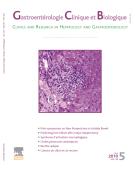A double blind randomized controlled trial of a probiotic combination in 100 patients with irritable bowel syndrome - 23/04/08

Summary |
Objectives |
The purpose of this study was to evaluate the effects of a probiotic combination on symptoms in patients with irritable bowel syndrome (IBS).
Methods |
We investigated the efficiency of a probiotic dietary supplement, containing four strains of lactic acid bacteria, on symptoms of IBS. One hundred and sixteen patients with IBS fulfilling the Rome II criteria were randomized in a parallel group, double-blind study to receive a placebo or a probiotic combination (1×1010cfu once daily) for four weeks. The symptoms that were monitored weekly included discomfort, abdominal pain, and stool frequency and quality. Quality of life was assessed before and at the end of the treatment using the SF36 and FDD-quality-of-life questionnaires.
Results |
One hundred subjects completed the study (48 probiotic combination, 52 placebo). The probiotic combination was not superior to the placebo in relieving symptoms of IBS (42.6 versus 42.3% improvement). However, the decrease of abdominal pain between the first and the fourth week of treatment was significantly higher in probiotic treated patients (−41.9 versus −24.2%, P=0.048). Interesting findings from the IBS sub-groups were also observed such as a lower pain score at end point in patients with alternating bowel habits (P=0.023) and an increase of stool frequency in the constipated sub-group from the first week of probiotic treatment (P=0.043).
Conclusions |
The probiotic combination was not significantly superior to the placebo in relieving symptoms of IBS. Despite the apparent high placebo response, interesting findings from IBS sub-groups were observed in the field of abdominal pain and stool frequency.
Il testo completo di questo articolo è disponibile in PDF.Résumé |
Objectifs |
L’objectif de cette étude était d’évaluer l’efficacité d’un mélange probiotique chez des patients présentant des troubles fonctionnels intestinaux (TFI).
Méthodes |
Nous avons évalué l’efficacité d’un complément alimentaire à base de probiotiques (contenant quatre souches de bactéries lactiques) sur les symptômes associés aux TFI. Cent seize patients souffrant de TFI identifiés selon les critères de Rome II ont été inclus dans une étude clinique randomisée en double insu contre placebo. Ils ont reçu pendant quatre semaines un placebo ou un mélange probiotique (1×1010ufc une fois par jour). Les symptômes étudiés ont inclus l’inconfort, la douleur abdominale, ainsi que la fréquence et la qualité des selles. La qualité de vie a été évaluée avant et à la fin du traitement en utilisant les questionnaires SF36 et FDD-quality-of-life (QOL).
Résultats |
Cent sujets ont terminé l’étude (48 sous probiotiques, 52 sous placebo). Le mélange probiotique ne s’est pas révélé supérieur au placebo dans le soulagement des symptômes associés aux TFI (42,6 versus 42,3 % d’amélioration). Cependant, la diminution de la douleur abdominale entre la première et la dernière semaine de traitement était significativement plus importante chez les patients ayant consommé le mélange probiotique (−41,9 versus −24,2 %, p=0,048). De plus, l’analyse des sous-groupes (TFI avec diarrhée, constipation ou alternance des deux) a permis de mettre en évidence une diminution du score de douleur abdominale chez les patients avec alternance diarrhée–constipation (p=0,023) et une augmentation dès le première semaine de traitement de la fréquence des selles chez les patients souffrant de TFI avec constipation prédominante (p=0,043).
Conclusions |
Le mélange probiotique n’a pas été supérieur au placebo concernant le soulagement des symptômes associés aux TFI. Cependant, des résultats intéressants ont été obtenus plus spécifiquement dans le domaine de la douleur abdominale et de la fréquence des selles.
Il testo completo di questo articolo è disponibile in PDF.Mappa
Vol 32 - N° 2
P. 147-152 - Febbraio 2008 Ritorno al numeroBenvenuto su EM|consulte, il riferimento dei professionisti della salute.

